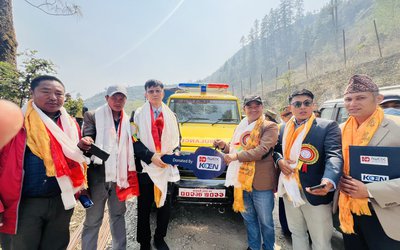
Films offer glimpses of the contemporary society of concerned countries. Japan is not an exception. Starting from February 14, an online film festival, also available in Nepal, is helping people know and understand the history, culture and contemporary social and economic development of Japan.
Organized by The Japan Foundation, the festival, which will continue till February 27, can be watched virtually in 25 countries.
Out of 20 films, eight films are available for Nepalese audiences. These include Bread of Happiness, Happy Flight, The Floating Castle, Mio’s Cook Book, The Chef of South Polar, Sumodo: The Successor of Samurai, The God of Ramen and Rashomon. List of Film
A message to the audience
Due to the current pandemic, many people around the world are grappling with feelings of pain, sadness, and isolation. “In these times, our hope is that this film festival can provide even some small sense of relief, and help people to live with a positive outlook on the future. For this year’s festival, we have selected 20 films, from new releases to classics, which fit with the theme,” said the organizers.
Scenic beauty across the seasons, visually stunning and vividly colorful Japanese food, the changing of society from traditional to modern, and fantastic worlds which transcend space and time… “our hope is that by experiencing these various worlds within Japan, viewers will feel refreshed and whether this festival gives many people or even just one person the dream to one day visit Japan.”
“We welcome all of our Nepali friends to this Japanese Film Festival Online, which you can enjoy varieties of Japanese movies, wherever you are! Please look through the selections available, from documentary films to heart-warming stories. Register with us to create your account, and choose your preferred films from the list below, then you can explore new aspects of the Japanese culture!,” said the Japanese Embassy in Kathmandu.
The Sumo Successor of Samurai is one of the interesting films which depicts the life and challenges of Sumo players in Japan.
A film all about sumo—Japan's national sport, a documentary with rare access into the behind-the-scenes lives of famous sumo wrestlers!
Sumo wrestling is said to have already existed in Japan over a thousand years ago and is still a nationally popular event today. Sumo wrestlers (a.k.a. rikishi), who boast huge physiques, not only compete in physical matches but also serve in Shinto rituals. This film closely follows famous sumo wrestlers to show how they live, train, and how they feel when they step onto the ring. There is no other sport in the world where two wrestlers weighing 200 kilograms collide head-on without protective gears. Sumo wrestlers are always at risk of injury, but no matter the amount of pain, it is never used as an excuse in the stoic "way of sumo" and "way of the samurai". This is an invaluable record of the lives of these modern-day samurai up close and personal. The excitement of live sumo tournaments is also palpable.
Among other many films, Happy Flight 2008 was very interesting. The film narrates a story of an international flight from Tokyo to Honolulu, Hawaii. A new pilot boards as an assistant to a more experienced senior pilot, and a new cabin attendant joins the team of a purser who has a reputation for being strict. The ground staff are struggling with bookings, the staff in the control tower are on alert about the weather and birds, and the mechanics are pouring their hearts and souls into accomplishing speed and precision in their work. With the combined efforts of all the workers, the flight finally takes off but they are soon faced with trouble.
Through episodes related to the work involved in operating large commercial passenger flights, the film spins an entertaining tale that shows the growth of new staff members with both humor and suspense. The film exudes a sense of realism through the meticulous research that went into learning about the work of in-flight and on-the-ground flight staff and how they problem-solve. An ensemble of top actors in Japan including Haruka Ayase, one of Japan's most popular female actors, raises the film to higher planes.
Similarly, all other movies in the film festivals have shown different aspects of Japanese society.
- IME GROUP: Expands Into Paper Industry
- Mar 24, 2025
- CPN UML: Instigated By India
- Mar 23, 2025
- ADB’S CHIEF ECONOMIST: Nepal Reduces Poverty
- Mar 11, 2025
- FM DR. DEUBA: A Successful Visit
- Mar 11, 2025
- MD GHISING: Target Of Personal Grudge
- Mar 09, 2025















